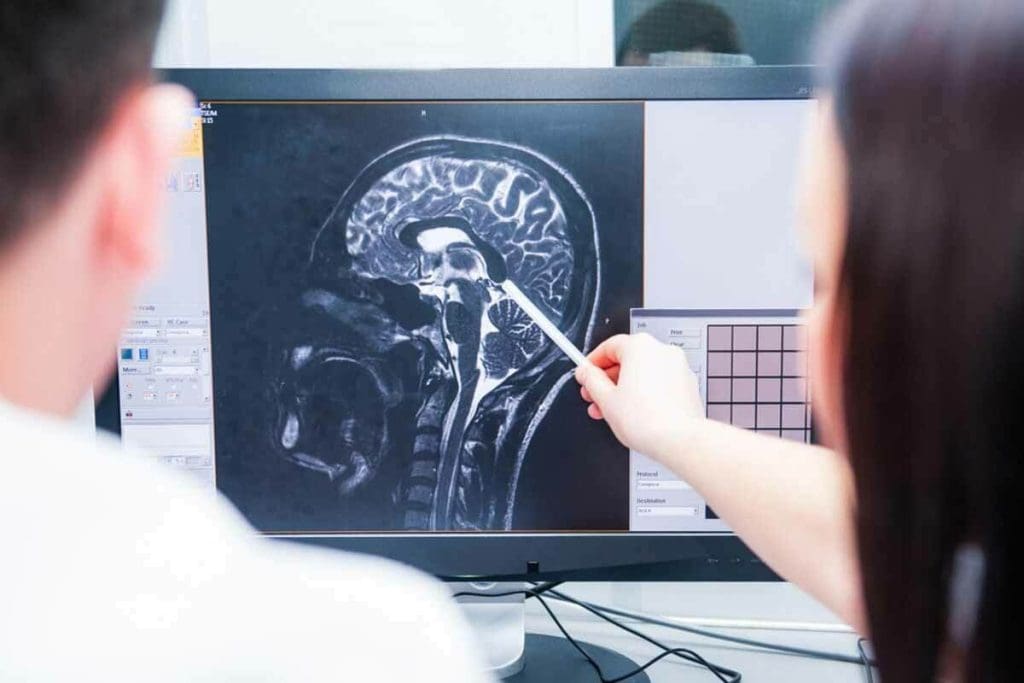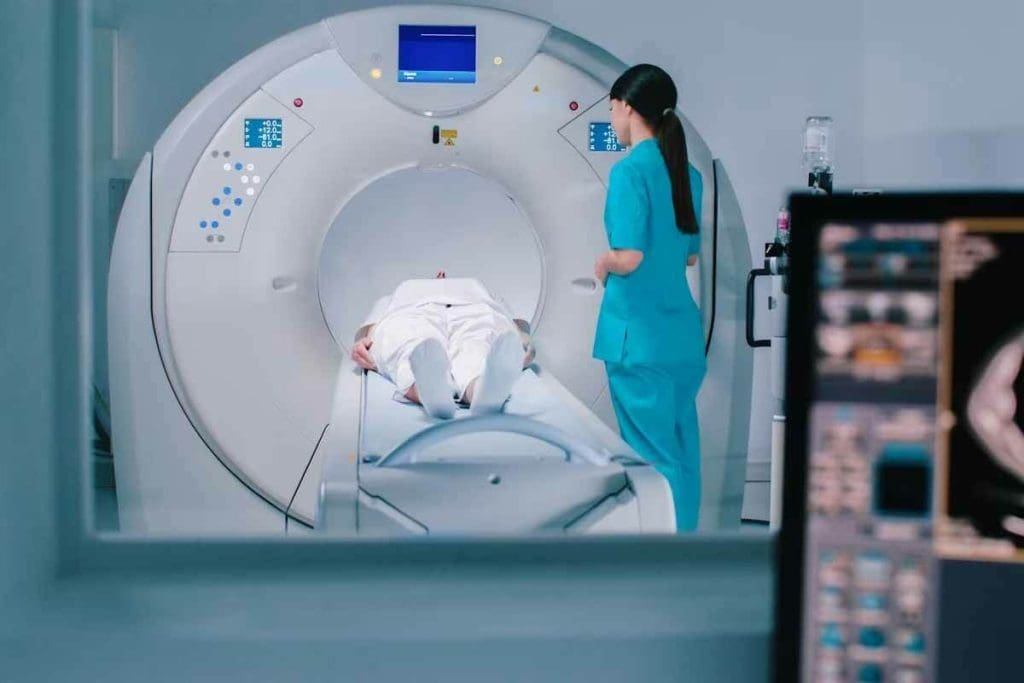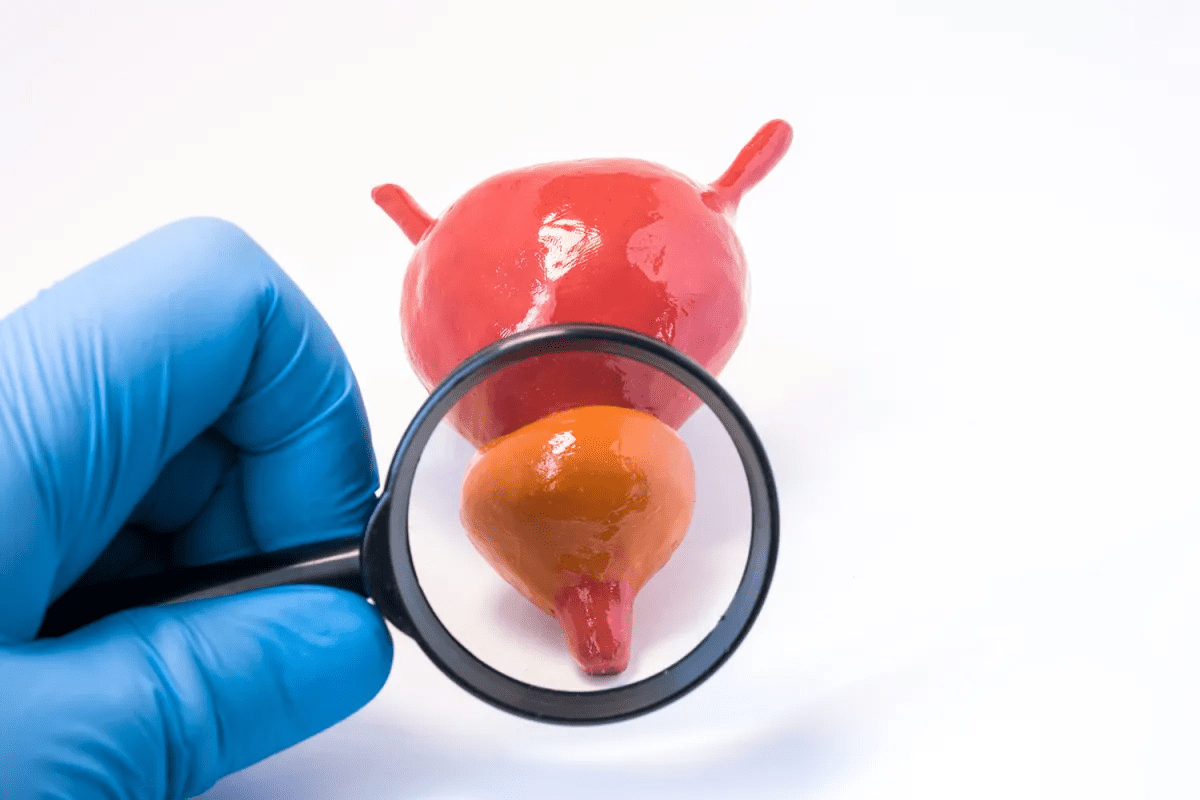Last Updated on November 27, 2025 by Bilal Hasdemir

Magnetic Resonance Imaging (MRI) is a key tool for checking the brain and body. It gives detailed images without harmful radiation. Many patients ask, “Can I get a brain scan? ” and at Liv Hospital, we focus on keeping patients safe while following the newest MRI guidelines to ensure accurate and reliable results.
Getting an MRI can make people worried, like pregnant women or those with metal implants. The Radiological Society of North America says MRI is usually safe during pregnancy if it’s really needed. But, you must tell your doctor about your pregnancy or metal implants before the scan.
Key Takeaways
- MRI scans are considered safe for most individuals, including pregnant women when medically necessary.
- It’s essential to disclose pregnancy or suspected pregnancy before undergoing an MRI.
- Gadoliniun use during pregnancy should be carefully considered, weighing benefits against possible risks.
- MRI compatibility with metal implants varies; some implants are safe, while others may pose risks.
- Informing your healthcare provider about any metal implants or pregnancy is key for a safe MRI procedure.
Understanding Brain MRI Scans and Their Importance

Brain MRI scans have changed how we diagnose health issues. They give us detailed views of the brain and soft tissues without harmful radiation. This makes MRI a key tool in medical science.
How MRI Technology Works
MRI scanners use a strong magnetic field and radio waves to create detailed images. This is great for looking at the brain, showing small problems that other methods miss. Research shows MRI during pregnancy is safe for both mom and baby, as found on NCBI.
To get an MRI, you lie on a table that slides into the machine. It uses magnetic fields and radio waves to take pictures of your brain. The test is usually painless but might be noisy.
Common Reasons to Get a Brain Scan
Doctors often suggest a brain MRI for several reasons. These include:
- Diagnosing and tracking conditions like multiple sclerosis, stroke, or tumors
- Looking into symptoms like dizziness, weakness, or seizures
- Checking for brain or head injuries
- Seeing how treatments are working
The Excellent Safety Record of MRI Technology
MRI technology is known for being safe. It doesn’t use harmful radiation like X-rays or CT scans. This makes it safer for patients, even for those needing many scans. Research shows MRI is safe when done right.
Is MRI Dangerous to Your Health? Debunking Myths
Despite being safe, some myths and worries surround MRI. Some are concerned about the strong magnetic fields or contrast agents. But, most evidence proves MRI is safe if done correctly. Always talk to your doctor about any worries before an MRI.
MRI safety is a big deal, and many studies back it up. Knowing how MRI works and its uses helps patients make better health choices.
MRI Safety During Pregnancy: What the Research Shows

MRI is a key tool for checking on mom and baby during pregnancy. It doesn’t use harmful radiation like X-rays or CT scans. This makes MRI safer for pregnant women.
Non-Contrast MRI Studies
Studies show that non-contrast MRI is safe for pregnant women. No known adverse effects have been associated with non-contrast MRI exposure to fetuses. It’s great for checking on both mom and baby.
Before getting an MRI, tell your doctor you’re pregnant. They’ll weigh the benefits and risks. MRI is good for checking on things like appendicitis and liver diseases.
Gadolinium Contrast Agents and Pregnancy Concerns
The debate on gadolinium contrast agents in pregnancy is ongoing. They’re usually avoided because of possible risks. Gadolinium crosses the placenta and is excreted by the fetal kidneys, but we don’t know all the effects.
Using gadolinium contrast agents should be thought through carefully. If it’s needed, it should be used with caution. Patients should know the risks and benefits.
In summary, MRI is a good choice for pregnant women, but gadolinium contrast agents need careful thought. Always talk to your doctor about your pregnancy before any MRI.
Metal Implants and MRI Compatibility: What You Should Know
Before getting an MRI, it’s important to know how metal implants might react. Many people have implants like knee replacements or hip prosthetics. These can make you worry about safety during an MRI.
Can You Have an MRI with a Knee Replacement?
Having a knee replacement doesn’t always mean you can’t have an MRI. But the material of your replacement is key. Most knee replacements today are safe for MRI scans, made from titanium or certain stainless steel types.
Key factors to consider:
- The material used in your knee replacement or other metal implants.
- The age of your implant, as older ones might have different materials.
- The specific MRI protocol used, as some are safer for metal implants.
Tell your doctor about any metal implants you have. They will check if your implant is safe for the MRI. They’ll make sure you’re safe during the scan.
In some cases, your doctor might suggest a different MRI machine or scan settings. This is to avoid any problems with your metal implant.
MRI Compatibility of Common Metal Implants
Different implants have different MRI safety levels. For example:
| Implant Type | Material | MRI Compatibility |
| Knee Replacement | Titanium/Stainless Steel | Generally Compatible |
| Hip Prosthetic | Metal-on-Metal/Metal-on-Polyethylene | Usually Compatible, Check Specifics |
| Surgical Clips | Stainless Steel/Titanium | Mostly Compatible, May Require Precautions |
Knowing about your implant’s MRI safety is key for a safe scan. Always talk to your doctor to figure out the best plan for you.
Tattoos, Permanent Makeup, and MRI Safety Considerations
Tattoos and permanent makeup are becoming more common. This means we need to look closer at MRI safety. As MRI technology gets better, it’s important to know how it works with body art.
Tattoos and permanent makeup are everywhere, and they can make people worry about MRI safety. Most of the time, they’re not a big deal. But we need to think about how to keep everyone safe during scans.
Understanding Risks with Metallic Inks in Tattoos
Some tattoos have metallic inks that might cause problems during an MRI. These inks can heat up or react badly. It’s rare, but we should check for these risks before scanning.
Precautions for Patients with Body Art and Permanent Makeup
If you have tattoos or permanent makeup, there are steps to take for MRI safety. First, tell the MRI tech about your tattoos or makeup. If you know what’s in them, share that too. Sometimes, a test is done to see if there’s a bad reaction.
The MRI place might do special things, like use a weaker MRI or cool the tattoo area. In some cases, you might not be able to get an MRI. Or, you might need to use a different test instead.
By being careful and knowing the risks, people with tattoos or makeup can safely get MRI scans. It’s a team effort between you and your doctor to make sure the scan goes well.
Orthodontic Work and MRI Compatibility
Orthodontic work and MRI compatibility are key for many patients. MRI technology keeps getting better. It’s important to know how orthodontic appliances work with MRI machines for safe and effective scans.
Permanent Retainers and MRI Safety
Permanent retainers keep teeth in place after orthodontic treatment. They’re usually made of metal wires. Most modern permanent retainers are MRI-compatible, but they might cause image distortions.
Tell your MRI technician about your retainer before the scan. They might adjust the imaging to avoid any problems.
Braces, Fillings, and Other Dental Materials
Braces, fillings, and other dental materials are common concerns for MRI patients. Fortunately, most dental materials today are MRI-compatible. But some materials, like those with ferromagnetic metals, can cause issues during the scan.
Modern MRI machines are made to reduce risks from metal objects, including dental materials. Most braces and fillings are safe for MRI scans because they’re made from non-ferromagnetic materials. But it’s important to tell your healthcare provider about your dental work before an MRI.
This way, they can take the right precautions and get the best imaging results.
Some dental materials might cause problems with MRI images. Our medical team works with radiologists to make sure patients with dental work get the best scans. We address any issues before they happen.
MRI Contraindications: When You Should Not Get an MRI
MRI scans are usually safe, but there are times when they’re not safe. Both patients and doctors need to know when to avoid them. This ensures everyone stays safe during the scan.
Medical Devices and Implants That Pose Risks
Some medical devices and implants can be dangerous in an MRI’s strong magnetic field. This can cause harm or make the device stop working. Here are some examples:
- Pacemakers and Implantable Cardioverter-Defibrillators (ICDs): These devices can be affected by the MRI’s magnetic field. This might lead to the wrong therapy or device failure.
- Metallic Implants: Some metallic implants, like those that are ferromagnetic, can heat up or move during an MRI. This can cause tissue damage or other problems.
- Cochlear Implants: These implants can be damaged by the MRI. Some may need special precautions or other imaging methods.
If you have these devices, tell your doctor before getting an MRI. They might suggest other imaging methods or take special steps to keep you safe.
Health Conditions That May Affect MRI Safety
Some health conditions can also make MRI scans unsafe. These include:
- Severe Kidney Disease: People with severe kidney disease might be at risk of developing nephrogenic systemic fibrosis (NSF) if they get gadolinium-based contrast agents during an MRI.
- Claustrophobia: While not life-threatening, severe claustrophobia can make it hard to get an MRI. Sedation or open MRI machines might be options for these patients.
- Allergies to Contrast Agents: Some people might be allergic to the contrast agents used in MRI scans. Precautions or other imaging methods can be considered for these patients.
Telling your doctor about your full medical history before an MRI is key. This helps them check for any risks.
Knowing these contraindications and taking the right precautions helps doctors perform MRI scans safely and effectively.
MRI Machines and Metal: Understanding the Interaction
It’s important to know how MRI machines and metal interact for safe scans. MRI tech has grown a lot, but metal in or near the body is a big safety issue.
Minimizing Metal Risks with Modern MRI Machines
Today’s MRI machines have safety features to lower metal risks. These include:
- Stronger Magnetic Fields: Stronger fields are safer because they’re more controlled.
- Better Shielding: MRI machines now shield better to prevent magnetic field leaks.
- Advanced Cooling Systems: These systems prevent overheating, a risk with some metal implants.
These updates have made MRI scans safer for people with metal implants. But it’s key to do pre-scan screening.
Ferromagnetic vs. Non-Ferromagnetic Materials
Not all metals react the same to MRI machines. The main difference is between ferromagnetic and non-ferromagnetic materials.
- Ferromagnetic Materials: These are strongly attracted to magnets and can be risky during an MRI. Examples include iron and some types of steel.
- Non-Ferromagnetic Materials: These materials are not attracted to magnets and are safer during MRI scans. Examples include titanium and some other alloys.
Knowing the metal type in your body is key to checking if an MRI is safe for you.
Pre-Scan Screening and Safety Questionnaires
Before an MRI, patients go through a detailed screening. This includes:
- Completing a detailed safety questionnaire about any metal in or on their body.
- Reviewing their medical history to spot any risks.
- A physical check for any metal objects that could be risky.
This process is vital for spotting risks and taking steps to avoid them.
During the Scan: Managing Anxiety and Claustrophobia
For some, the MRI scan can be scary, mainly for those with claustrophobia. To help:
- Open MRI Machines: Some places have open MRI machines, which are less confining.
- Relaxation Techniques: Deep breathing, meditation, and other relaxation methods can help.
- Anxiolytic Medication: In some cases, medication may be given to help with anxiety.
Talking to your healthcare provider about your worries can help find the best ways to manage anxiety during the scan.
Conclusion: Making Informed Decisions About Brain MRI Safety
We’ve looked into the safety and benefits of brain MRI scans. They are safe for most people. Knowing about MRI safety during pregnancy, with metal implants, and tattoos helps make informed decisions about getting a brain MRI.
MRI technology is safe and non-invasive, making it a great tool for diagnosis. For pregnant women, MRI is usually safe. But, using gadolinium-based contrast agents is done with care. This knowledge lets patients feel sure about getting a brain MRI when it’s needed.
Knowing about brain MRI safety helps people choose their diagnostic options wisely. We suggest talking to your healthcare provider about your situation and worries. This way, you can make the best decisions for your health.
FAQ
Is it safe to get an MRI while pregnant?
It’s best to talk to your healthcare provider about the risks and benefits. Non-contrast MRI studies are usually safe. But, gadolinium contrast agents might pose some risks.
Can I have an MRI with a knee replacement?
It depends on your knee replacement type and MRI safety. Always check with your healthcare provider or the implant maker to see if it’s safe for an MRI.
Are tattoos or permanent makeup a contraindication for MRI?
Most tattoos or permanent makeup don’t stop you from getting an MRI. But, tell your healthcare provider about any body art or makeup to ensure safety.
Can I get an MRI with orthodontic work, such as braces or a permanent retainer?
Most orthodontic work is okay for MRI. Just let your healthcare provider know about any dental materials or appliances for safe scanning.
What are the contraindications for MRI?
Some medical devices, like pacemakers, and health conditions, like claustrophobia, might not be safe for MRI. Talk to your healthcare provider about any concerns.
How do modern MRI machines minimize metal risks?
New MRI machines use advanced safety measures to reduce metal risks. We also ask questions before scanning to spot any possible risks.
Can MRI be dangerous to your health?
MRI technology is safe when used correctly. We clear up common myths and highlight its safety record.
How can I manage anxiety or claustrophobia during an MRI scan?
We offer many ways to help with anxiety and claustrophobia, like relaxation techniques and sedation. Tell your healthcare provider about any worries about a comfortable scan.
Are MRIs safe for individuals with dental implants?
Most dental implants are safe for MRI. But it’s important to tell your healthcare provider about any dental items for safe scanning.
What is the difference between ferromagnetic and non-ferromagnetic materials in MRI compatibility?
Ferromagnetic materials are drawn to MRI’s strong magnetic field. Non-ferromagnetic materials are not. Knowing the materials in implants or devices helps determine MRI safety.
References
- Al-Naser, Y. A. (2024). MRI patient safety and care. In StatPearls. StatPearls Publishing. https://www.ncbi.nlm.nih.gov/books/NBK604477/






